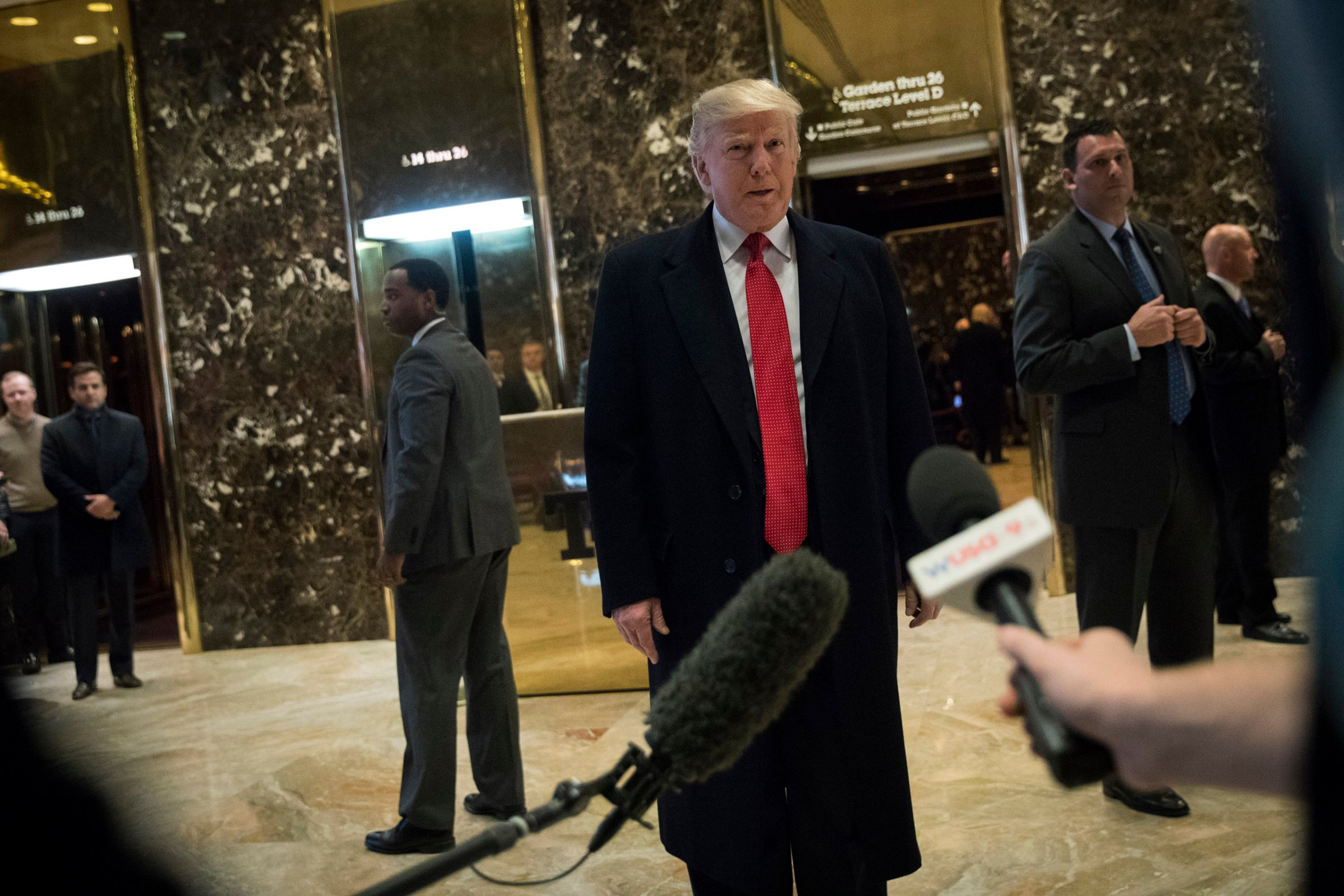
On Oct. 7, at the height of the presidential campaign, a tape appeared of Donald Trump saying vile things about women to Access Hollywood host Billy Bush. We, the media, went berserk. For the next two weeks, as various women came forward accusing Trump of sexual assault, the coverage was wall to wall. Hillary Clinton’s campaign snapped at the bait and made Trump’s misogyny the centerpiece of its strategy.
Also on Oct. 7 came the mind-blowing news that the U.S. intelligence community, including all 17 agencies, believed the Russians were behind the hacking of internal Clinton and Democratic Party email accounts. This news was accompanied by candidate Trump’s strange affinity for Vladimir Putin. It was also accompanied by Trump’s unwillingness to release his tax returns, which made it impossible to find out whether the developer was in financial cahoots with Russian oligarchs, how much he might owe them, how much they could have invested in him. Any one of these stories would have been an outrage. Taken together, they pointed to an unthinkable conclusion that the CIA had privately reached: the Russians were trying to tilt the election to Trump.
The unprecedented meddling was the most important scandal of the 2016 election, but it seemed to get lost in the Trumpian clutter. It just seemed too crazy — too Manchurian candidate, too Hollywood — to be real. It wasn’t as, well, sexy as Trump’s trash talk and groping, which shouldn’t have come as a surprise to anyone, given his crude track record. In the end, it’s possible that the Access Hollywood fiasco might have even helped Trump, confirming his machismo for a certain puerile sector of the male electorate (and confirming that boys will be boys for the women who voted for him). And speaking of “locker room” talk, Trump has now gone on to pick a Cabinet that looks like the locker room at Trump National Golf Course.
I am not saying the Access Hollywood story wasn’t newsworthy; it surely was. Nor am I saying the Russian hacks caused Clinton to lose the election; she did that all on her own. But the Russian interference in the ceremony that stands at the center of our democracy was nothing less than a foreign act of cyberwarfare, or as former CIA executive Mike Morell put it, “the political equivalent of 9/11.” And it wasn’t treated with sufficient heft by the media, especially cable television.
But now it must be. The President-elect must release his tax returns. The Russian connection must be fully explored. The relationship between Secretary of State–designate Rex Tillerson and the Russians must be vetted. The media pressure to make this happen must be focused and relentless.
There is a larger lesson here for the media, going forward: there is a method to Trump’s mouthiness. He is, without question, the most expert news manipulator in American history. He can even exploit embarrassments like Access Hollywood. He throws chum into the water — a tweet here about election fraud, a tweet there about flag burning — and cable news goes crazy for a news cycle, which only reinforces Trump’s credibility with his constituency. In the meantime, more serious stuff is being ignored. There needs to be a very strict and sober sense of priorities, especially on the cable news channels where a horse race and showbiz usually prevail. This is a sensitive and perhaps dangerous moment for the media. Journalists will have contradictory functions: the relentless pursuit of the truth in serious matters like the Russian affair will have to be matched with an open-minded willingness to give credit where it is due.
Trump hasn’t actually done anything yet, and his opponents are acting as if the sky has fallen. They are playing into his hands: if you begin with constant outrage, there’s no place to go when something truly outrageous happens. And what if this turns out to be a popular presidency? It is entirely possible that a rapprochement with the Russians, based on common commercial interests, will be good for the peace of the world. It is possible that Trump’s ideological appointees will clean out the cobwebs in departments and agencies like Health and Human Services, Labor, Education and the EPA. It is possible that Trump’s public shaming of manufacturers like Carrier will make American corporations think twice before going elsewhere. It is even possible that Trump’s massive and continuing conflicts of interest will be a good thing — the more hotels and golf courses and oil deals he and his cronies have around the world, the less likely they’ll be to blow it up. Nothing is unthinkable anymore.
More Must-Reads from TIME
- How Donald Trump Won
- The Best Inventions of 2024
- Why Sleep Is the Key to Living Longer
- How to Break 8 Toxic Communication Habits
- Nicola Coughlan Bet on Herself—And Won
- What It’s Like to Have Long COVID As a Kid
- 22 Essential Works of Indigenous Cinema
- Meet TIME's Newest Class of Next Generation Leaders
Contact us at letters@time.com